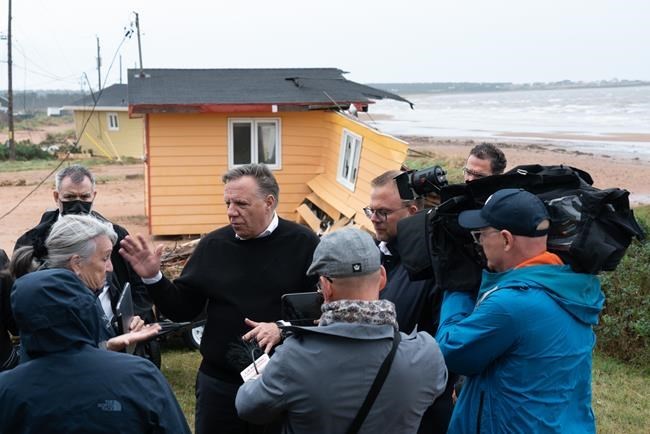
Coalition Avenir Québec Leader François Legault meets residents at la Martinique in Îles-de-la-Madeleine, Que., Monday, Sept. 26, 2022. THE CANADIAN PRESS/Nigel Quinn
Republished September 27, 2022 - 1:08 PM
Original Publication Date September 27, 2022 - 1:06 AM
MONTREAL - With polls indicating his party is set to win a big majority on Oct. 3, Coalition Avenir Québec Leader François Legault on Tuesday rejected calls to reform the electoral system and instead said he was open to working with the opposition.
The CAQ is projected to win close to 100 seats in the 125-seat legislature, according to poll-aggregator website QC125.com, but the party is polling at less than 40 per cent support. Meanwhile, the Conservatives, who are polling at roughly 15 per cent, are projected to win no seats.
Despite that math, Legault has said that electoral reform is a concern for "intellectuals." On Tuesday, the premier said Quebecers just aren't interested in changing the system.
“It’s not a priority for Quebecers, but we’ll see how they vote on Oct. 3," Legault told reporters during a campaign stop on the Gaspé Peninsula. "Nothing is settled, no one has been elected."
Parti Québécois Leader Paul St-Pierre Plamondon noted on Tuesday that his party was the only one that has seen significant upward movement in the polls since the start of the election campaign in late August — but the PQ is still only projected to win one seat.
A poll released Tuesday by Leger, for Quebecor media properties Journal/TVA/QUB, has the CAQ at 37 per cent support, followed by Québec solidaire, the Liberals, the Conservatives and the Parti Québécois, each with 15 to 17 per cent support. The poll cannot be assigned a margin of error because respondents were selected from an online panel and not at random. The PQ started the election campaign with nine per cent, according to Leger.
St-Pierre Plamondon implored Quebecers to consider the consequences to democracy if Legault's party isn't met with a sizable opposition in the legislature. "Do we want to give absolute power to François Legault without any counterbalance or the least counterbalance possible? Or do we want strong opposition parties? And what kind of opposition parties do we want?"
Legault promised during the 2018 election to reform the voting system. The CAQ introduced legislation in its first mandate to create a mixed electoral system in which 45 of the 125 ridings would be distributed based on proportional representation. But the bill died quickly and Legault has since maintained that Quebecers don't care enough to change the status quo.
The CAQ leader described himself Tuesday as a uniting figure and said he is open to working with opposition parties on issues such as the environment and the protection of French. “I see my role as premier to bring people together, to work with the opposition,” Legault said, brushing off suggestions by the opposition that he is arrogant, saying Quebecers don't see him that way.
In Montreal, Liberal Leader Dominique Anglade did not believe Legault's expression of good faith. “If there is one thing that François Legault has shown us in the last four years, it is his unwillingness to collaborate,” she told reporters, adding that he prefers to impose his ideas on others.
Québec solidaire co-spokesperson Gabriel Nadeau-Dubois also questioned Legault's willingness to work with opposition parties, but he accepted Legault's olive branch. He told reporters that regardless of the outcome on Oct. 3, his party will work “with everyone who is going to want us to fight climate change."
Meanwhile, St-Pierre Plamondon admitted Tuesday that one of his party volunteers had stolen electoral pamphlets belonging to the CAQ. His admission came one day after Marie-Eve Rancourt, a candidate running with Québec solidaire in his Montreal riding, withdrew after a security video was posted online showing her removing a PQ pamphlet from a voter's mailbox.
Rancourt's name will be stricken from the ballot and any votes for the party in the Camille-Laurin riding will be cancelled. St-Pierre Plamondon stands to benefit from Rancourt's withdrawal because the PQ and Québec solidaire have some similar voters, who support Quebec independence and strong action on climate change.
Also Tuesday, Élections Québec said a record 23 per cent of Quebec's 6.3 million eligible voters participated in two days of advanced polls. More than 1.44 million people cast votes on Sunday and Monday. Three ridings around the provincial capital reported advanced voting turnout of more than 30 per cent.
"This is indeed the highest participation rate following the advance poll," said Dany Lapointe, a spokesperson for the office that oversees elections. In 2018, 18 per cent cast an early ballot, which was down from 19 per cent during the 2014 vote.
It's unclear, however, whether the record number of early ballots is a sign of high overall turnout or a shift in voting behaviour.
In the 2018 election, about 67 per cent of eligible voters cast a ballot, down from 71 per cent in 2014.
This report by The Canadian Press was first published Sept. 27, 2022.
— With files from Stéphane Rolland, Patrice Bergeron, Caroline Plante and Frédéric Lacroix-Couture.
News from © The Canadian Press, 2022